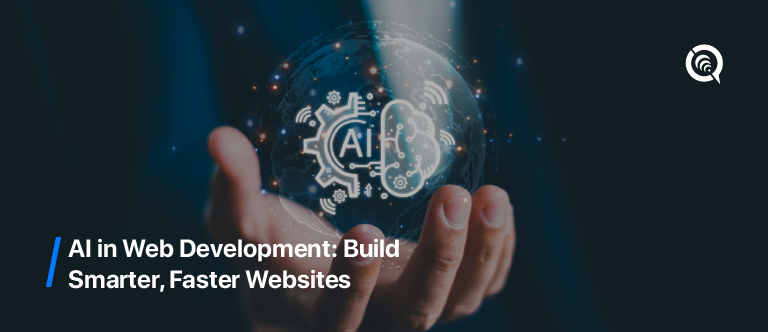AI in Web Development: A 2025 Breakthrough
Artificial Intelligence (AI) is transforming web development in 2025—going far beyond buzzwords and reshaping how websites are designed, coded, optimized, and personalized. AI-driven tools like GitHub Copilot, ChatGPT, and Uizard streamline tasks such as code generation, UI design, and content creation, dramatically reducing development time and cost.
By integrating AI into every stage of the development lifecycle, businesses can automate testing, accelerate page speed, improve accessibility, and enhance UX through real-time personalization. For example, tools like Adobe Sensei and Hotjar use behavior data to guide design decisions, while NitroPack and Google Cloud optimize site performance dynamically—boosting SEO and Core Web Vitals.
In eCommerce, AI recommendation engines increase conversions through intelligent product suggestions. AI also fortifies web security with real-time threat detection using tools like Cloudflare and Darktrace. Developers now rely on AI for smart debugging, accessibility checks, and automated content optimization—leading to faster launches and better digital experiences.
Small businesses, startups, and enterprises alike are using AI-enhanced platforms like Webflow, Wix ADI, and Dialogflow to build and manage smart websites with little or no code. As AI technology evolves, the web development role shifts from manual building to managing intelligent systems that learn and adapt.
In short, AI is no longer optional—it’s the competitive edge. It enables teams to build smarter, faster, more secure, and more personalized web experiences with unprecedented efficiency.
Read Full Article - https://www.applogiq.org/
Artificial Intelligence (AI) is transforming web development in 2025—going far beyond buzzwords and reshaping how websites are designed, coded, optimized, and personalized. AI-driven tools like GitHub Copilot, ChatGPT, and Uizard streamline tasks such as code generation, UI design, and content creation, dramatically reducing development time and cost.
By integrating AI into every stage of the development lifecycle, businesses can automate testing, accelerate page speed, improve accessibility, and enhance UX through real-time personalization. For example, tools like Adobe Sensei and Hotjar use behavior data to guide design decisions, while NitroPack and Google Cloud optimize site performance dynamically—boosting SEO and Core Web Vitals.
In eCommerce, AI recommendation engines increase conversions through intelligent product suggestions. AI also fortifies web security with real-time threat detection using tools like Cloudflare and Darktrace. Developers now rely on AI for smart debugging, accessibility checks, and automated content optimization—leading to faster launches and better digital experiences.
Small businesses, startups, and enterprises alike are using AI-enhanced platforms like Webflow, Wix ADI, and Dialogflow to build and manage smart websites with little or no code. As AI technology evolves, the web development role shifts from manual building to managing intelligent systems that learn and adapt.
In short, AI is no longer optional—it’s the competitive edge. It enables teams to build smarter, faster, more secure, and more personalized web experiences with unprecedented efficiency.
Read Full Article - https://www.applogiq.org/
7 months ago

